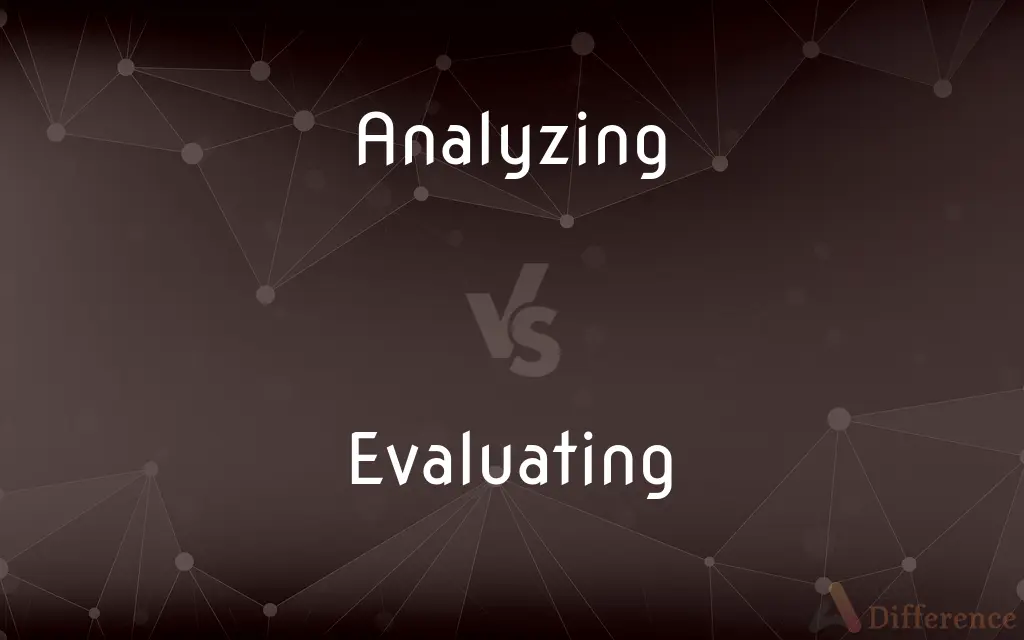Analyzing vs. Evaluating — What's the Difference?
By Tayyaba Rehman — Published on November 2, 2023
Analyzing involves examining in detail, while evaluating is judging or determining value. Both are critical thinking skills, but analyzing is about understanding, and evaluating is about assessing worth.

Difference Between Analyzing and Evaluating
Table of Contents
ADVERTISEMENT
Key Differences
Analyzing refers to the process of breaking down a complex topic into smaller parts to gain a better understanding of it. The primary goal is to dive deep into the subject to uncover relations, patterns, and functionalities. On the other hand, evaluating involves making judgments about the value of ideas, items, or events. While analyzing is focused on understanding how things work or why they happen, evaluating is concerned with determining the effectiveness, value, or significance of something based on certain criteria.
Analyzing requires a detailed examination and interpretation of data, literature, or any phenomenon. This process demands a systematic approach to dissect the subject into manageable pieces, study how these parts relate to one another, and comprehend the overall structure or meaning. Conversely, evaluating requires the application of specific standards or criteria to measure or judge the quality or worth of something. It goes beyond understanding the subject to formulating an informed opinion or decision about it.
Analyzing is a neutral and objective process. It does not involve making judgments but seeks to present facts as they are. The outcome of analysis is usually detailed information about the subject, leading to a deeper understanding. Evaluating, however, is not just about understanding but involves a degree of subjectivity as it requires one to make judgments. It often leads to a decision, recommendation, or opinion about the subject's value.
Analyzing is a key step in critical thinking because it allows us to understand an idea or situation better. It involves questioning, examining evidence, and interpreting complex information. Evaluating, meanwhile, builds on the insights gained from analysis to make informed judgments or decisions. It involves weighing evidence, assessing the credibility of sources, and considering the usefulness or relevance of information in a given context.
Analyzing and evaluating are both essential in problem-solving and decision-making processes. Analyzing provides the detailed information needed about the various aspects of a problem, making it clearer and more understandable. Evaluating takes this a step further by assessing the pros and cons, risks and benefits, and various other criteria necessary to make informed and effective decisions.
ADVERTISEMENT
Comparison Chart
Purpose
Understanding a subject deeply
Assessing the value or worth
Process
Dissecting and interpreting
Judging against criteria
Outcome
Information, understanding
Decision, opinion
Nature
Objective
Somewhat subjective
Role in Decision Making
Provides detailed information
Leads to a decision
Compare with Definitions
Analyzing
A systematic examination and interpretation of data.
Analyzing these results could help us predict future outcomes.
Evaluating
Making judgments about the value of various subjects.
He's evaluating the proposals right now.
Analyzing
Investigating the elements of a concept to understand its nature and function.
They're analyzing the feedback for areas of improvement.
Evaluating
Assessing something's worth, significance, or status.
Evaluating all the options can be time-consuming.
Analyzing
Examining something in detail to understand it better.
She spent the whole afternoon analyzing the report.
Evaluating
Analyzing and judging the quality or value of something.
We're evaluating potential risks of this approach.
Analyzing
The process of studying or examining something in an organized way.
Analyzing consumer behavior is key to our marketing strategy.
Evaluating
Formulating opinions or conclusions based on certain criteria.
They're evaluating the candidates based on their experience.
Analyzing
Breaking down information into smaller parts to see how they relate.
By analyzing the data, we found some interesting trends.
Evaluating
The process of judging or determining the significance of something related to known standards.
She's evaluating the effectiveness of the marketing campaign.
Analyzing
To examine methodically by separating into parts and studying their interrelations.
Evaluating
To ascertain or fix the value or amount of
Evaluate the damage from the flood.
Analyzing
(Chemistry) To make a chemical analysis of.
Evaluating
To determine the importance, effectiveness, or worth of; assess
Evaluate teacher performance.
Analyzing
(Mathematics) To make a mathematical analysis of.
Evaluating
(Mathematics) To calculate the numerical value of; express numerically.
Analyzing
To psychoanalyze.
Evaluating
Present participle of evaluate
Analyzing
Present participle of analyze
Common Curiosities
Can analyzing lead to evaluating?
Yes, analyzing often provides the information necessary to move on to the evaluating phase.
Does analyzing involve decision making?
Analyzing is a step towards decision-making by providing detailed insights, but it doesn't involve making the decision itself.
Is analyzing subjective?
Analyzing aims to be objective, focusing on understanding and interpreting information without personal judgments.
Do I need specific criteria for analyzing?
Analyzing doesn't necessarily require set criteria but does require a methodical approach to dissecting and interpreting information.
Does evaluating always result in a decision?
Often it does, as the purpose of evaluating is to assess value or quality, typically leading to a decision or judgment.
Can evaluating be done without analyzing first?
It's possible, but analyzing provides the necessary information for more informed evaluating.
What is more critical in research, analyzing or evaluating?
Both are crucial; analyzing provides a deep understanding of data, while evaluating helps assess its implications.
Why is evaluating important in education?
Evaluating helps in assessing students' learning, teachers' performance, and the effectiveness of educational programs.
Are there specific methods for analyzing?
Yes, various methodologies can be applied depending on the field and nature of the information.
Can evaluating be biased?
Yes, since it involves personal or societal criteria for judgment, bias can influence evaluating.
Is analyzing only used for data?
No, analyzing can be applied to a range of subjects, including concepts, behaviors, texts, etc.
What skills are needed for evaluating?
Critical thinking, understanding of criteria, and the ability to make judgments are key for evaluating.
Is evaluating always subjective?
Evaluating often involves subjectivity since it requires applying personal or established criteria to form judgments.
Does analyzing require expertise?
It often does, especially when dealing with complex subjects or large amounts of data.
Can one person perform both analyzing and evaluating?
Yes, individuals often engage in both processes, especially in research, problem-solving, and decision-making contexts.
Share Your Discovery

Previous Comparison
Bromethalin vs. Diphacinone
Next Comparison
Hazara vs. PashtunAuthor Spotlight
Written by
Tayyaba RehmanTayyaba Rehman is a distinguished writer, currently serving as a primary contributor to askdifference.com. As a researcher in semantics and etymology, Tayyaba's passion for the complexity of languages and their distinctions has found a perfect home on the platform. Tayyaba delves into the intricacies of language, distinguishing between commonly confused words and phrases, thereby providing clarity for readers worldwide.
















































